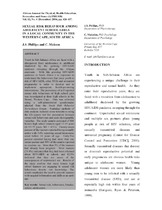Sexual risk behaviour among female school adolescents in a local community in the Western Cape, South Africa
Abstract
Youth in Sub-Saharan Africa are faced with a changeover from adolescence to adulthood shadowed by the growing HIV/AIDS epidemic sweeping through the African continent. With this growing HIV/AIDS epidemic in South Africa it is important to understand the behaviours that place youth at risk of HIV/AIDS, other STDs and unwanted pregnancies in order to develop and to implement appropriate health-promoting interventions. The prevalence of self-reported sexual risk behaviours of high school girls was investigated at three high schools in the Strand, Western Cape. Data was collected using a self-administered questionnaire adapted from the Youth Risk Behavior Surveillance System. Statistical methods of data analysis included cross-tabulations using the Chi-square test for association between sexual risk behaviours and socio-demographic variables. The study sample consisted of 801 female high school learners aged 13-19 years (X=15.75 years, SD = 1.57). Twenty-seven percent of the learners reported being sexually active with 3.6% reporting sexual intercourse onset before 14 years of age. Forty-five percent reported having had more than one sexual partner and 50% of the sample reported no condom use. More than 5% of the learners had already been pregnant. Most learners (78.9%) indicated that they had been informed about HIV/AIDS at school, and 82.5% indicated that they are aware of the consequences of unprotected sex. Results of the study confirm that many female high school learners are engaging in sexual risk behaviours despite risk knowledge. The results emphasise the need to provide learners with targeted information and skills at an early age.

